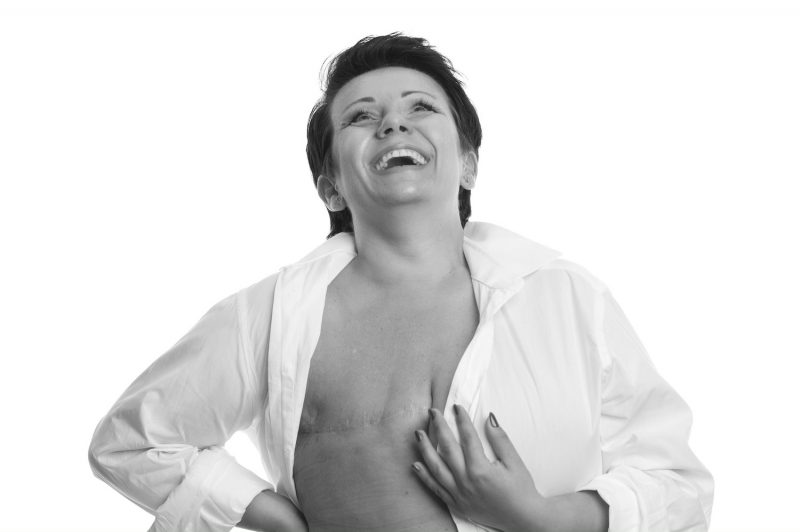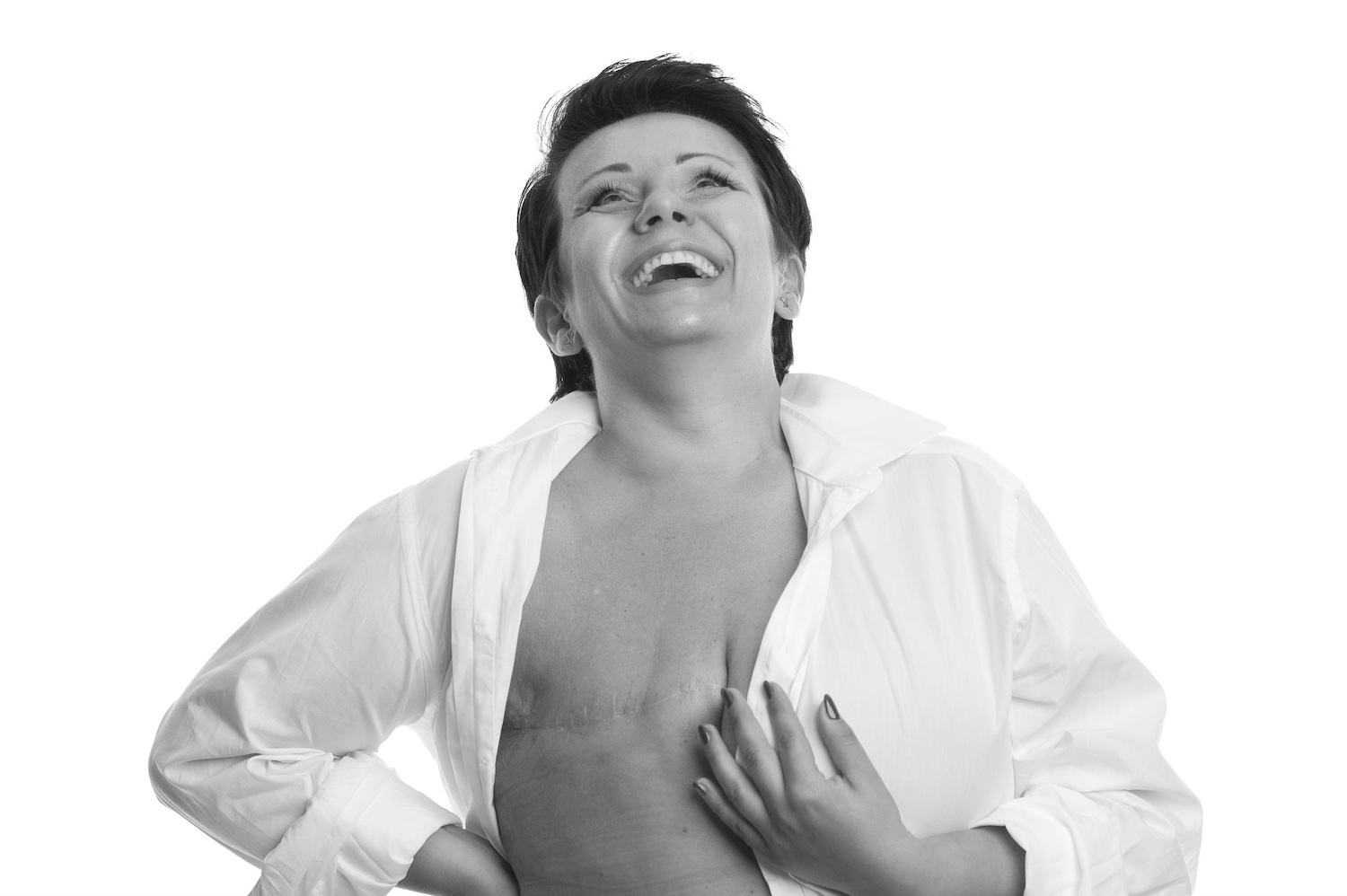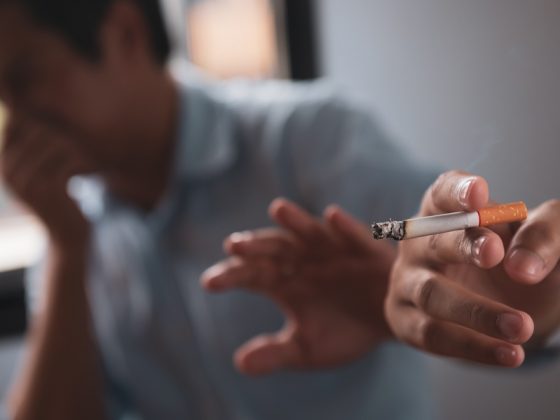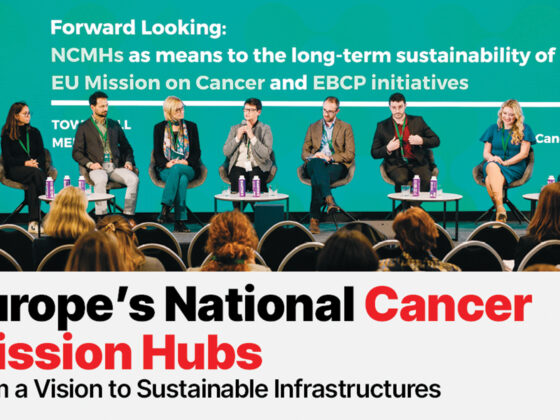It all started with a high school friendship. Anna Szołucha, a photographer who specialises in noir-style black-and-white female nudes, read a post by her high school friend Agnieszka Ford on social media. Agnieszka wrote that she was in a medical consultation for breast reconstruction.
“It was an impulse,” recalls Szołucha. “I wrote to her and said that, after the surgery I would do a photo shoot for her with my professional partner Małgorzata Lakowska.” She didn’t have to wait long for Agnieszka’s response: “Let’s do this now.”
“I didn’t hesitate for a moment,” recalls Agnieszka Ford, who immediately thought that photos of her with her mastectomy scar could be used to promote breast cancer awareness. “I wanted to show other women that a mastectomy is not the end of life or womanhood.” The resulting photo in an unbuttoned white shirt has become iconic and inspiring for many women.
It was the starting point for the ‘Pomacaj się’ (‘Touch yourself’) photography project, which was set up in 2019 to help cancer charities to raise awareness, but then took on a life of its own as a way of empowering women, with up to 230 women now having taken part in the – often emotional – photo sessions. There is currently a waiting list of 130 women from all over Poland.
At the beginning, the project aimed to do individual photo sessions with just 25 people. The founders, Szołucha, Lakowska and Ford, set up an online fundraiser to pay for the studio, make-up, travel, and accommodation. Their initial hope that the photos would be taken up by cancer foundations for use in their campaigns did not come to fruition. But something else did. The project’s Facebook page became unexpectedly popular, with more and more women signing up for the shoots.
“We didn’t have the heart to refuse,” recalls Szołucha. They decided to set up their own foundation, Kochasz Dopilnuj, to keep the Pomacaj się campaign going, and provide other awareness raising activities, such as self-examination lessons for women.
There have now been nine editions of Pomacaj się, and the tenth is underway. Between 15 and 25 women take part in each edition, depending on the finances, time, and photographers’ availability. The sessions are free of charge and participants can claim travel and accommodation costs.
“Through their portraits, we want to show that it is possible to feel beautiful, feminine, and sexy, despite the disease and often mastectomy,” says Lakowska. “We don’t want these sessions to become a routine for us. It’s supposed to be a unique experience for our heroines every time.”
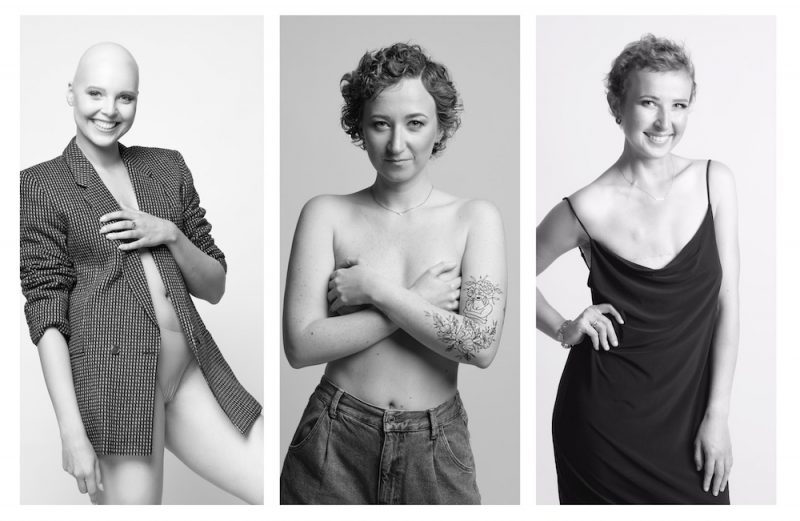
Joanna from Katowice
While undergoing chemotherapy, breast-conserving surgery and radiotherapy, Joanna from Katowice followed the Kochasz Dopilnuj foundation page on social media. “I liked the black-and-white artistic nudes,” she says. “They were very moving.” After finishing treatment, she decided to send in an application.
The photo shoot was also a way of closing this stage in her life. “I thought it would be a kind of ‘icing on the cake’, a gift for myself,” she says. She turned up to the professional studio in Warsaw on Valentines Day.
“It was just make-up, but I was touched because I saw myself from before the illness”
The organisers always handle the professional make-up, help choose an outfit and suggest which poses to adopt. “For those few hours, I was a real model, and that’s how I felt. When the girls took me in, did my make-up, and I looked in the mirror, I had tears in my eyes.” Professional make-up made her feel like herself again. “It was just make-up, but I was touched because I saw myself from before the illness,” she says.
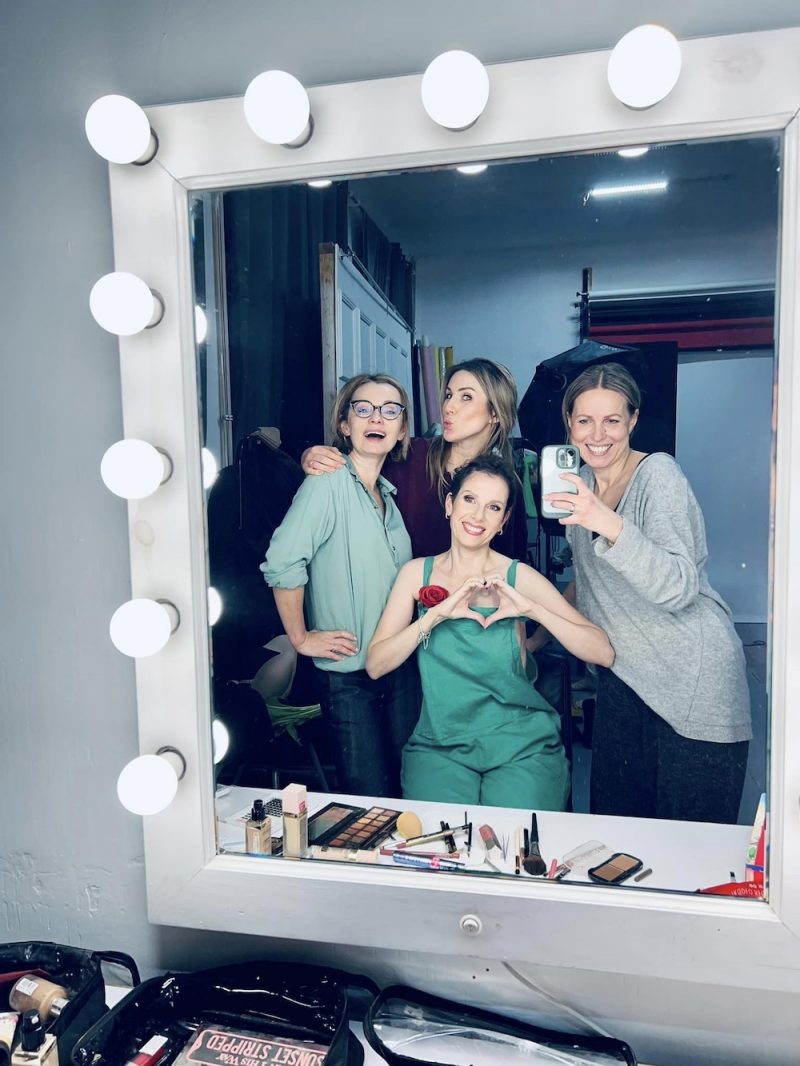
“Although the shots are bold, I wasn’t tense at all. I laughed and saw myself in a different way. I soaked up the experience like a sponge.”
She is emotional when she recalls her first reaction to the photos. “When I saw the result of my session I was left speechless, which I admit very rarely happens to me. I looked so beautiful in the photographs. I couldn’t believe that the photographers saw me like that, while in my head I still have a slightly different image of myself affected by the illness.”
Ewelina from Warsaw
Ewelina Dróżdż, who was diagnosed with breast cancer at only 27 years old, speaks with similar enthusiasm. “I felt special,” she says. “It was a professional photo shoot, but I didn’t feel uncomfortable. There was real fun and joy.”
She had heard about the Pomacaj się project long before her illness: “‘What terrific women!’ I thought. I could not imagine getting out of the hole of an illness like breast cancer.” She applied for a session not long after her diagnosis, but the queue was long. She had to wait several months, but at least this gave time for her hair to grow back, she says.
“When I got these pictures I realised how strong I was,” Ewelina says. “I still want to look at them over and over again.”As a kindergarten teacher, she wondered how the pictures would be received when she posted some of the less daring ones on social media. But it was fine.
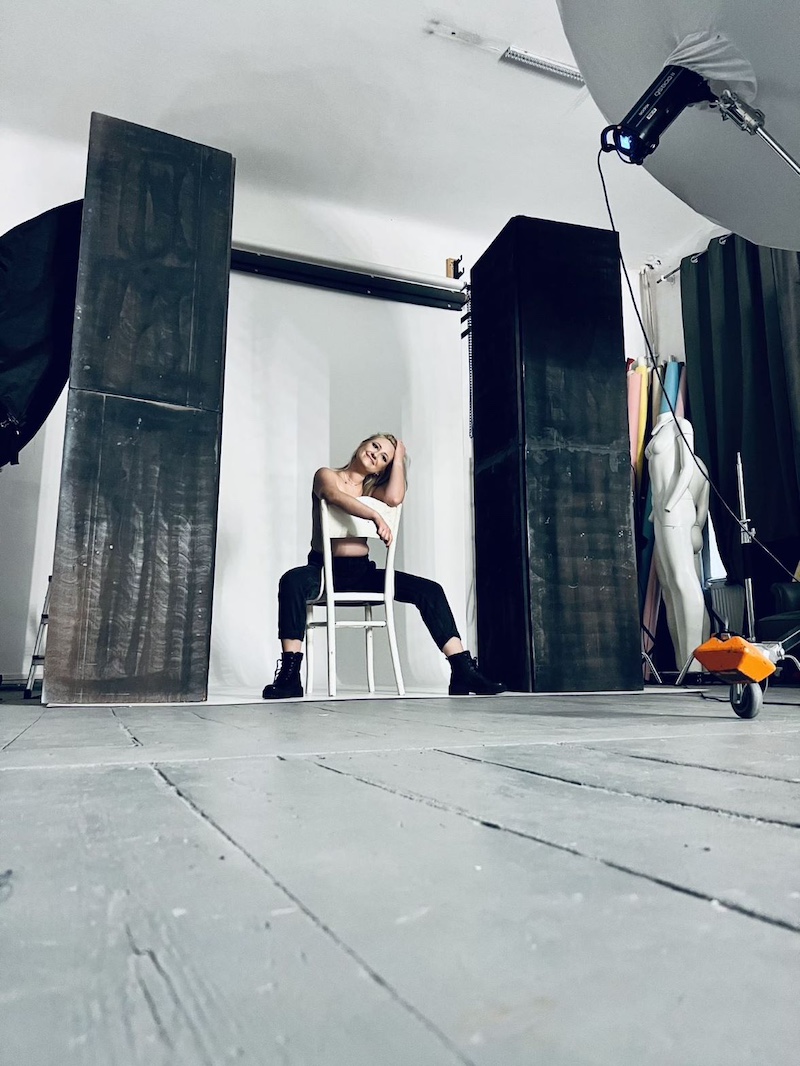
A message to younger women
Beyond the personal lift they get from the photo shoot, women like Joanna and Ewelina are motivated to take part in Pomacaj się by a desire to raise awareness that breast cancer can develop in younger women as well, and it is important to be attentive to possible symptoms, to do regular self-examinations, to raise any worries with their doctor, and ask for ultrasound imaging.
This campaigning aspect was the original motivation for launching the project, and remains an important focus. “Over the last 30 years, the incidence of breast cancer in women aged 20 to 49 has almost doubled,” says Agnieszka Ford. “Our heroines include some very young people, that is why we are urging girls to get tested from as young an age as possible.”
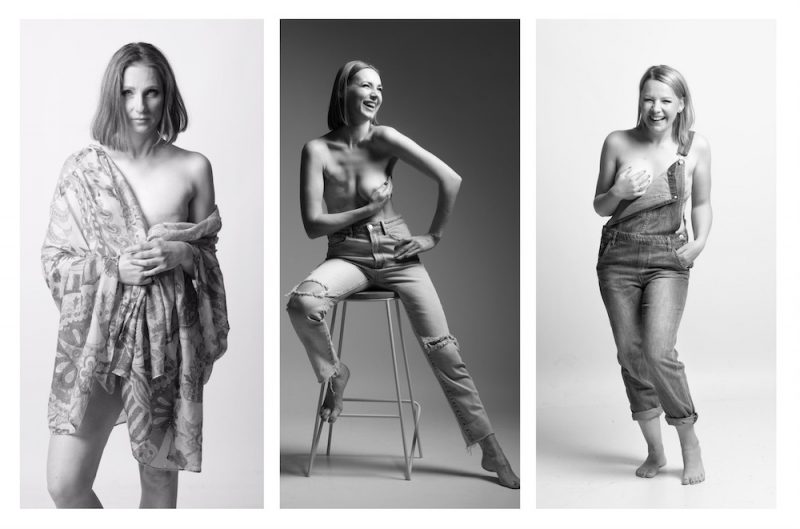
In accordance with the EU evidence based screening guidelines, Poland recommends that, in the absence of specific concerns or risk factors, women should start attending regular breast screening at 45 years old. However, many of the women who book a photo shoot with Pomacaj sie feel they were let down by those guidelines, and want to ensure younger women are better informed about their potential risk and how to protect themselves. In Joanna’s case, despite attending six-monthly ultrasound scans because of a history of numerous cysts in her breast, her breast cancer was picked up by self-examination, two months after her previous scan, and four months before the next one was due. “Only thanks to my vigilance did I manage to catch a tumour when it was still small,” she says.
Photos from the sessions have now been posted on three occasions on billboards in Poland’s biggest cities, as part of awareness campaigning.
The initiators hope to be able to continue with the Pomacaj się project for as long as the participants keep coming – and so do their ‘heroines’. “I hope that this project will never end, because I would like everyone to have such an experience,” concludes Joanna. “May the girls do this good for as long as possible.”
About the photos
The opening illustration is the photo of Agnieszka Ford – the first photo of the Pomacaj się project, which has since achieved iconic status in Poland. All photos come from Pomacaj się photo sessions and are published by kind permission of the ‘heroines’ and the Kochasz Dopilnuj foundation. ©Kochasz Dopilnuj foundation

